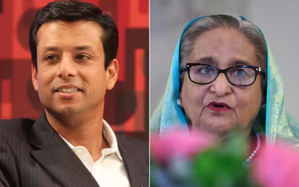America
Bangladesh Unrest: Sheikh Hasina's Son Suggests US Involvement, Despite Lack of Evidence

August 10 :
This happened on August 10 in Washington DC, US: While Sajeeb Wazed Joy, son of former Bangladeshi prime minister Sheikh Hasina, has not found proof of American meddling in the country's student protests, he does point to Muhammad Yunus's popularity as a "darling of the west" as evidence of foreign influence.
In addition, Wazed mentioned that the West has always supported Yunus, who took office as the leader of Bangladesh's temporary government on August 8, and was fast to back his administration, which led him to assume that there was clear foreign interference in the turmoil.
Wazed asked, "Was the US directly involved?" in a previous interview. I am uncertain. I don't have any proof. However, when you examine the circumstances and the protests closely, you'll notice that they were constantly stoked and agitated. He made the point that the demonstrations had started off peacefully and were not meant to target the government per such, but rather a court decision that the administration had likewise opposed.
The demonstrations were nonviolent when they initially began. Protecting them were our police officers. It wasn't the government's action that was the target of the protest. Following the initial wave of anti-quota rallies, our administration cut quotas years ago. Our government appealed the court's decision to reestablish the quotas. His explanation was that they were anticipating the Supreme Court's decision.
Guns were supplied to the demonstrators by an international supplier, according to Wazed.
Armed with weapons, the demonstrators began attacking the cops. What gave these demonstrators the right to bear arms? It is only possible for a country's intelligence agency to import weapons. This has been initiated and backed by foreign forces. Whether it's coming from the West or not, Yunus is the candidate that these demonstrators have chosen. The west loves him. They have been advocating for him and seeking to include him in politics for many years. Initially, his government received congratulations and backing from the West. The implication that they were likely involved in this entire affair is being made extremely clear, in Wazed's opinion.
According to Wazed, the protests escalated when demonstrators misquoted Sheikh Hasina's remarks about Razakars.
Someone misquoted my mom and then disseminated the rumor far and wide on the internet. They took what my mom said—that we don't want Razakar family receiving government jobs—and turned it into her falsely accusing the demonstrators of being Razakars. Some group was obviously trying to inflame the matter online. We want quotas abolished, therefore our administration appealed to the Supreme Court on July 15. Someone began demonstrating at Dhaka University in the middle of the night, yelling, 'We are Razakars.' This, he added, "inflamed our student activists," who then assaulted the demonstrators.
According to Wazed, the government suspended the cops involved because they used excessive force while trying to quell the unrest.
In an effort to quell the bloodshed, the police intervened. Excessive force was employed by certain police officers. After our government ordered the Bangladesh Chhatra League, a group of student activists, to desist from their actions, the bloodshed ceased. We suspended all of the police officers involved for using excessive force and appointed a three-judge panel to look into the deaths. To put an end to the bloodshed, our government took all necessary measures. The violence was intentionally caused by an unknown party; our administration never authorized it, Wazed continued.
The political climate in Bangladesh is currently unstable due to Sheikh Hasina's decision to resign from her position on August 5th, which she made in response to growing protests. Protests broke out in early July over calls to change a quota system that gives some groups, such as the descendants of warriors from the 1971 conflict, preferential treatment when applying for government positions. Just three days after Sheikh Hasina resigned from her position, 84-year-old Nobel laureate and economist Muhammad Yunus was sworn in as the leader of Bangladesh's interim administration on Thursday, August 8.



































